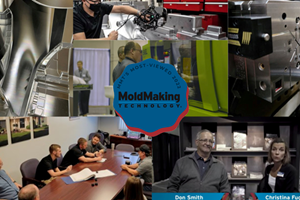Moldmaking and Mexico: What Can This Market Do for Your Business?
Opening a satellite sales and service center south of the border allows moldmakers to better compete in a global marketplace.
With 25 percent of the world's wealth and four percent of the world's population, Mexico lies just below the United States and has a very lucrative consumer base to be targeted by the moldmaking community. Yet, it has not been considered a force to be reckoned with because of its previous less-than-stable business climate. However, with Mexico's new president Vincent Fox in place, there are renewed hopes and expectations that the economic climate will turn around and business will boom.
This is good news for the industry. According to Glenn Starkey, president of Progressive Components (Wauconda, IL) - a supplier of mold components, mold bases and hot runner systems - a stronger Mexico will be good for the United States and the rest of North America because it will help the United States to be more competitive with Asia.
"One can see that a U.S.-built mold that's producing products that are molded on the border, assembled south of the border and shipped up to distribution points throughout the U.S. becomes competitive with an overseas product," Starkey explains. "The stronger that scenario is, the less likely that the entire toaster oven, for example, is coming over from the other side of the world. It's great for the U.S. toolmaker when Mexico is stable and strong because if we don't have a competitive hand within North America, then entire projects can be lost to the place with the cheapest set of hands."
Starkey stresses the importance of having a sales and service operation south of the border to establish an international presence. "Then there is a company presence with the customer during product development and there's someone available to open up the gates, to replace any worn mold details, etc.," he notes. "A U.S. moldmaker is in the same time zone as his Mexico customer and has a better ability to support what he sells. If one employs some creative thinking and effective strategizing, it's easier for a U.S. company to set up a sales and service center in Mexico than it would be for an overseas company. However, if U.S. mold companies don't do it, somebody else will. Those efforts are currently underway by other overseas competitors."
Setting Up Shop
Jim Meinert, owner of Mequon, WI based Snider Mold - which builds large compression, injection, RIM and structural foam molds - has been selling molds to Mexico for more than 30 years. "We started in Mexico by doing the seat molds for the plastic seats for the 1968 Olympics, and at this moment we are doing two different seating projects for customers in Mexico," he recalls. "It was this demand that started us. The customer called us from Mexico, because he heard that we were the 'experts' in seating and tooling. We pursued it to expand our markets and customer base, plus they paid in advance! We soon went into other Latin American countries and Europe."
Snider notes that there are a number of advantages to selling molds in Mexico: payment up front, expanding your business base and following your customers who may have moved operations to Mexico. Plus, he also feels that Mexico's new president will be an effective leader and bring more business into the country.
Unfortunately, there are some things to beware of when doing business in Mexico. Snider notes that at times you do not get paid; it's difficult to find a good agent; often poor product designs must be fixed; it's challenging to understand cultural differences; and dealing with unstable conditions in the economy and exchange rates can be frustrating.
Still, Snider urges moldmakers to take the plunge. "Get active, go there, find a good agent, create a local face or presence and open a mold service center," he states. "Show commitment to the market, work the trade shows, contact the commerce department, call the SPI to get their recent study on Mexico."
Tooling Science (Maple Grove, MN) - a builder of plastic injection and die cast molds for industries like recreational and medical - dove into the Mexico market about a year and a half ago. According to Sales Manager Mike Ditty, it happened a bit by accident. The company was doing a job for Lucent Technologies, now known as V-Tech, and while Ditty was down there he saw the potential for growth.
"There was a lack of support in Mexico," Ditty explains. "There are some small shops down there right now doing some mold work, but really only two shops that are known moldmakers, us being one of them. These are the only two in Guadalajara. Some OEMs are putting in moldmaking facilities down there, but those are captive shops for the most part."
While most moldmakers who are considering setting up operations in Mexico are thinking strictly sales/support, Tooling Science does have a mold building facility there, albeit a small one. Ditty acknowledges that it's not smooth sailing yet. "I'm a little worried about inflation in Mexico right now," he comments. "If there is a high inflation rate and that boosts wages, in my opinion, they will be noncompetitive fairly quickly because of all the benefits that would have to be paid out.
"What it takes to go into Mexico and start a business is horrendous," Ditty continues. "To operate a business there is difficult, and it's due to the Mexican government and red tape. Now if this Vincent Fox can initiate some change and Mexico can become more like Canada in the next 20 years, then things will be a lot better. So far Fox has a lot of good ideas."
For Tooling Science, problems include getting products over the border into Mexico, finding qualified moldmakers and locating reputable service bureaus. "Equipment and materials are not a problem," asserts Ditty. "The same people that sell tool steel in the states also sell it in Mexico. But getting someone to heat treat the steel is an issue. We don't know how good the heat treaters here do it."
Ditty adds that tooling in general just doesn't grow that fast, and it will probably take 20 years to build a sizable shop in Mexico, providing that the economy continues to improve. "There's a lot of opportunity down there, but how to get it and how to make money out of it is the real trick," he says. "We've been down there for a year and a half and aren't making money yet; we're still trying to figure out how to do that. It takes a lot to convince people down there that they should be working with you."
Like Meinert, Ditty advises those who have an interest in the Mexican market to do their research. "The best thing they can do is get help by getting information from people that are already down there," he says. "It's no easy endeavor, but it can be done if you do your homework."
Downer's Grove, IL-based Bales Mold Service - which specializes in polishing, chrome, plating, nickel and nickel Teflon and welding services - did just that, and opened a satellite facility last March just three miles from the Mexican border in Harlingen, TX. Harry Raimondi, the company's technical services manager, explains that the company tried to strategically choose a place to best serve all of its customers where the market is and give them a competitive edge.
"Today you can't sit back and rest on your laurels - we've been looking at this area for a number of years," Raimondi states. "After careful research we decided that there is a definite need for what we do down there. Time spent sending work up to our Midwest facility may make a lot of moldmakers reluctant and time is of the essence for everyone in this industry. We feel there's enough business down there with U.S. companies building new facilities. It will expand our customer base and give our current customers more options."
Raimondi believes that this move also will ensure the company's long-term success. "With the two facilities we believe that we can pretty much accommodate everyone's needs," he says.
Road Trip
For those still a little reluctant to sail uncharted waters, why not consider a trip to Mexico with your peers that share your vision? After last year's successful trade mission to Asia, Progressive Components' Starkey and Snider Mold's Meinert are planning a sojourn to Mexico in conjunction with the Society of the Plastics Industry (SPI) in December.
"With the moldmaking trade mission to Asia that Jim and I led last year, the entire group was surprised to hear some Asia toolmakers describe their strategy to target the Mexican market," Starkey says. "Several in the group said 'That's right under our noses, how come we're not doing something there?' That realization was the launch point for our aspiration to lead a trade mission to the Mexican border. We need to better learn how moldmaking companies and molding companies can serve a role with leading multinational OEMs - rather than not learning about the area and having an opportunity captured under our noses by overseas companies."
The mission's tentative dates are December 3-6, 2001 and will include plant tours, meetings with local businesses and government contacts, then a wrap-up session. Starkey urges moldmakers to get involved and get firsthand experience on how to establish a company presence internationally.
Meinert agrees. While currently sales and support facilities are underway in Mexico, changing times indicate that this will not always be the case. "The near future will require us to follow our customers into other countries with support, including repair, preventative maintenance, engineering changes, etc.," he says. "Multinationals from around the world are setting up in Mexico - it's no time for a siesta for U.S. companies."
Related Content
Hands-on Workshop Teaches Mold Maintenance Process
Intensive workshop teaches the process of mold maintenance to help put an end to the firefighting culture of many toolrooms.
Read MoreThe Role of Social Media in Manufacturing
Charles Daniels CFO of Wepco Plastics shares insights on the role of social media in manufacturing, how to improve the “business” side of a small mold shop and continually developing culture.
Read MoreConfronting the Mold Design Talent Drought
Recently, I reposted on LinkedIn the results of an informal survey we conducted, which revealed a shortage of skilled mold designers. It quickly gained a lot of traction. Given the response, I thought I'd summarize the feedback and keep the conversation going.
Read MoreMost-Viewed Content of 2022
The most popular MoldMaking Technology content according to analytics reports over the past 12 months.
Read MoreRead Next
How to Use Continuing Education to Remain Competitive in Moldmaking
Continued training helps moldmakers make tooling decisions and properly use the latest cutting tool to efficiently machine high-quality molds.
Read MoreAre You a Moldmaker Considering 3D Printing? Consider the 3D Printing Workshop at NPE2024
Presentations will cover 3D printing for mold tooling, material innovation, product development, bridge production and full-scale, high-volume additive manufacturing.
Read MoreReasons to Use Fiber Lasers for Mold Cleaning
Fiber lasers offer a simplicity, speed, control and portability, minimizing mold cleaning risks.
Read More





















